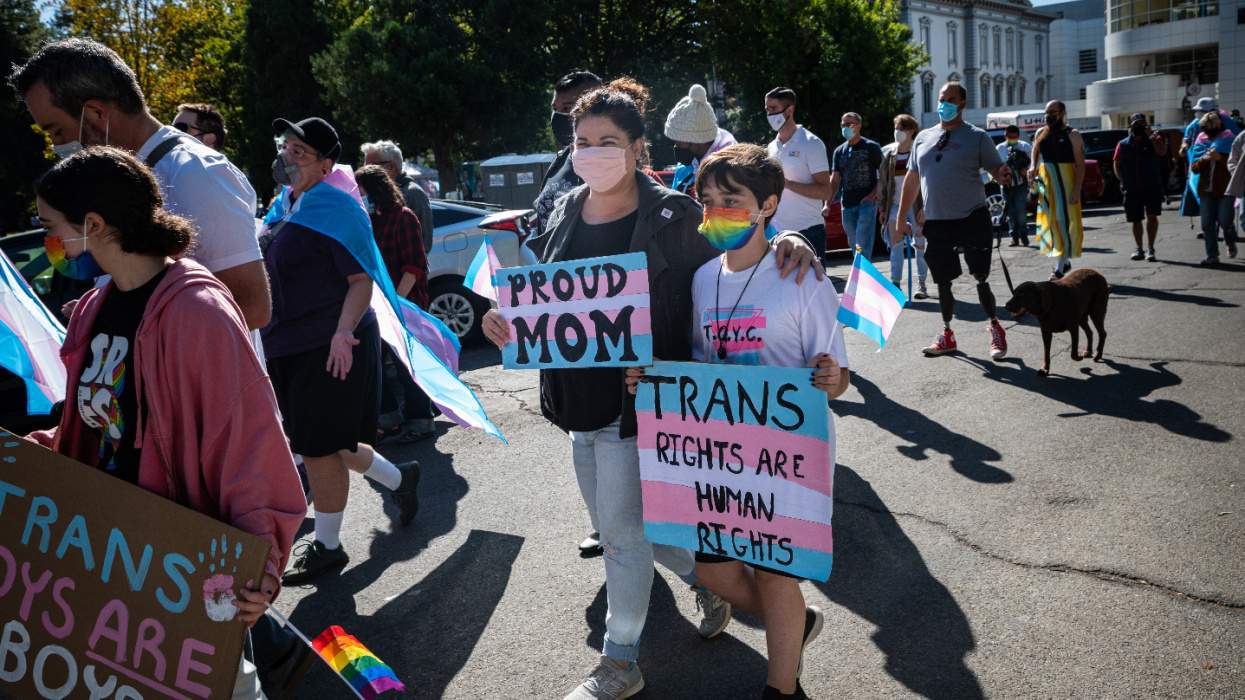Since 2016, the U.S. military has spent around $8 million on health care to treat the gender dysphoria and gender-confirmation procedures of roughly 1,200 transgender troops.
USA Today published the numbers released by the Department of Defense Wednesday. The report also broke down how many service members have been treated for gender dysphoria in the different branches of the armed services: Army (500), Navy (442), Air Force (354), Marine Corps (101), Coast Guard (33), Public Health Service (4), and reserves (90). The total is 1,542.
This number is low compared with a recent estimate of how many transgender people are serving: roughly 14,700, according to the Palm Center, a research institute that studies LGBTQ military inclusion. That number is based off of data from the Department of Defense and the Palm Center's own study on the Selected Reserve.
Based on these numbers, the military is the largest employer of transgender people in the United States, and these troops all stand to be fired under President Trump's transgender military ban.
Trump has argued that the military "cannot be burdened with the tremendous medical costs and disruption that transgender in the military would entail." Experts have disputed this assertion, arguing that the cost, when compared to the Pentagon's $716 billion budget, is minimal.
Indeed, it costs the federal government a high estimate of $3 million alone each time the president flies to his private club in Mar-A-Lago, reports NBC News, as Air Force One costs upward of $140,000 per hour to operate. It is estimated that Trump will have spent 28 percent of his term in transit to or staying at the Palm Beach resort.
In a first, transgender service members testified Wednesday on Capitol Hill, in response to Trump's efforts to expel them and prevent other trans people from enlisting. They emphasized their commitment to the military and their exemplary service, and said that being transgender had no ill effects on them or their fellow troops.
"Good leaders can take a team and make it work," Navy Lt. Cmdr. Blake Dremann told the House Armed Services Personnel Subcommittee, according to the Washington Blade. "Great leaders mold their teams to exceed expectations because it doesn't matter if you're female or LGBT. What matters is that each member is capable and focused on the mission." Dremann is president of SPARTA, a group that advocates for trans troops. He was one of five service members who testified.
Capt. Jennifer Peace, who has served 15 years in the Army and is currently an intelligence officer focusing on Iran, offered similar testimony. "We were out for extended time periods in the theater, in the deserts of California, in the forest of Wisconsin," she said. "There were never any issues that arose to being transgender. Between the time of the initial announcement of open service and the tweets of our commander in chief, the fact that I was transgender never came up. It wasn't something that needed to be discussed."
Representing the Trump administration, James Stewart, acting undersecretary of defense for personnel and readiness, contended the ban wasn't really a ban on transgender people, just an exclusion of people with gender dysphoria. There are other health conditions that exclude people from military service, he said.
Rep. Anthony Brown, a Maryland Democrat, struck back at him. "We are not talking about heart surgery and diabetes," Brown said, according to the Blade. "We are talking about a group of Americans who identify as transgender. I've never seen a group of Americans, OK, who are prone to heart attacks who come lobbying Congress and say give us the right to serve even though the risk of heart attack is very great because I've already had three or four. That's mixing apples and oranges and I don't appreciate that."
Stewart also claimed that current trans military members would be "grandfathered" and allowed to continue serving under the Trump policy, which does not appear to be the case. A memo on the policy, prepared by former Defense Secretary James Mattis and approved by Trump last year, says trans people willing to serve in their birth gender can stay in the military, and it has exemptions for a few others, but it would bar most.
Several federal courts have issued injunctions blocking the ban while cases against it proceed. The Supreme Court ruled in January to strike down some of these injunctions so that the ban could go into effect while it's being challenged in lower courts, but the decision did not include one injunction against the ban issued by a federal judge in Maryland. Lawyers for the administration have asked the judge to dissolve his injunction, but he has not done so yet, with the effect that the ban remains on hold.
The hearing was chaired by Rep. Jackie Speier, a California Democrat who heads the subcommittee and has introduced a bill to block the ban. Speier told the Blade she's moving forward with the legislation and may attach it to a defense spending bill.
--Additional reporting by Trudy Ring















Charlie Kirk DID say stoning gay people was the 'perfect law' — and these other heinous quotes
These are some of his worst comments about LGBTQ+ people made by Charlie Kirk.